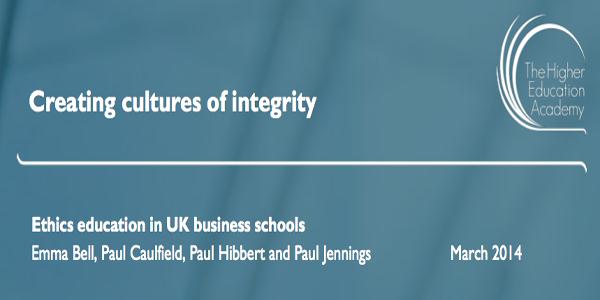
April 8, 2014, by ICCSR
New HEA report on “Creating Cultures of Integrity”
As part of responsible business week, the Higher Education Academy (HEA) this week published a report and series of case studies exploring the role of UK business schools in developing graduates with suitable tools to become strong ethical leaders of the future. One of these cases showcases some of the methods I used in the classroom prior to joining ICCSR.
The report was built on a number of consultations conducted during 2010-2011 on the theme ‘promoting cultures of integrity: ethical issues for business education’. These involved participants from business, media, governance, and academia, in collaboration with the Institute of Business Ethics (IBE). The meetings were held in Windsor Castle and offered an august location for building networks and exchanging open and honest perspectives. I represented the Foundation for Management Education (FME) that aims to integrate practice and academia. Former ICCSR member, Andy Crane was also a participant and contributed to the report, also Judith Irwin, a NUBS graduate in MSc CSR, represented IBE.
Whilst sometime ago now, I remember that the sessions promoted some interesting dialogues on the professionalisation of ethical behaviours in UK business and the challenges faced by leading business schools in promoting and developing these competencies in students. There was much agreement that some intervention was needed, but “What?” and “How?” proved more complex conversations.
As management educators, we all recognise that recent high-profile cases of unethical or irresponsible behaviours need to be addressed. The question has been asked about the roadmap to more sustainable, ethical, and responsible business leadership; And crucially the role and responsibilities of educators in achieving such aims.
Following these sessions, we were asked by the HEA, to develop a report on effective approaches to learning and teaching which might promote more sustainable, responsible, and ethical business behaviours. The report offers examples of good practice with contributions from several UK Universities, considering perspectives at multiple levels of intervention, ranging from the design of programmes, the integration of faculty, and the use of innovative tools in the classroom.
I hope this document begins a conversation, and one which links very nicely with the upcoming meeting of United Nations Principles of Responsible Management Education (PRME) in Winchester next week.
By Paul Caulfield
Lecturer in Responsible and Sustainable Business ICCSR
(recent addition from University of Bath)
SEE: http://www.heacademy.ac.uk/resources/detail/disciplines/business/BusinessEthics

[…] […]